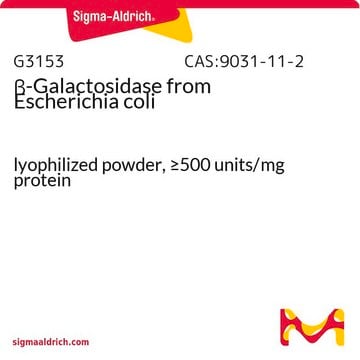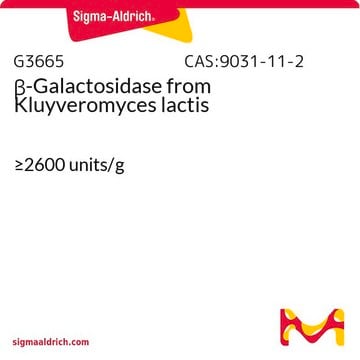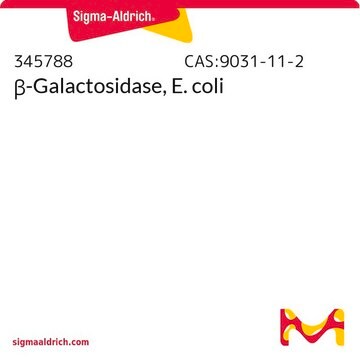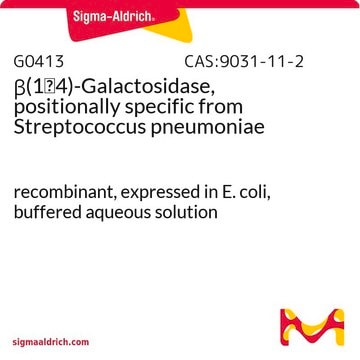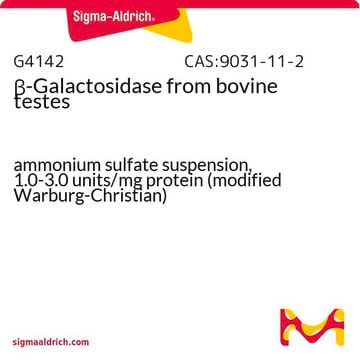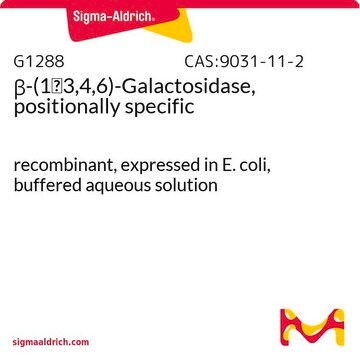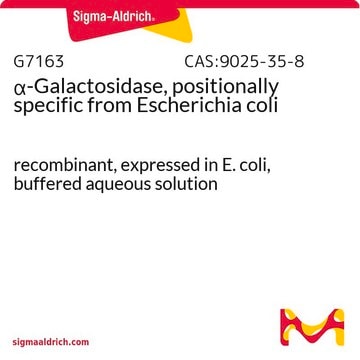G5160
β-Galactosidase from Aspergillus oryzae
≥8.0 units/mg solid
Synonym(s):
β-D-Galactoside galactohydrolase, Lactase from Aspergillus oryzae
Sign Into View Organizational & Contract Pricing
All Photos(3)
About This Item
Recommended Products
form
solid
specific activity
≥8.0 units/mg solid
contains
dextrin as extender
storage temp.
−20°C
Looking for similar products? Visit Product Comparison Guide
General description
β-Galactosidase is a member of the glycoside hydrolase clan A (GH-A) family. It is widely present in microorganisms, which includes both prokaryotes and eukaryotes.
Application
β-Galactosidase from Aspergillus oryzae has been used:
- in in vitro nuclear magnet resonance (NMR)
- as a standard in the β-galactosidase assay to determine the concentration of cell-associated β-galactosidase
- to modify sugar residues on the surface of the mutant slime cells to study the adhesive properties
- for enzymatic hydrolysis of lactose
- for reversed-phase (RP) adsorption
- in the hydrolysis of whey lactose
Biochem/physiol Actions
β-Galactosidase acts on the terminal β-D-galactosyl moieties of disaccharides, glycoconjugates, and polysaccharides. It is useful in mediating transglycosylation reactions such as the synthesis of galactooligosaccharides (GOS). β-Galactosidases might be used for glycobiological and biotechnological applications.
β-galactosidase cleaves lactose into its monosaccharide components, glucose and galactose. It also catalyses the transglycosylation of glucose into allolactose, the inducer of β-galactosidase, in a feedback loop.
Unit Definition
One unit will hydrolyze 1.0 μmole of lactose per minute at pH at 4.5 at 30 °C.
inhibitor
Product No.
Description
Pricing
substrate
Product No.
Description
Pricing
Storage Class Code
11 - Combustible Solids
WGK
WGK 3
Flash Point(F)
Not applicable
Flash Point(C)
Not applicable
Personal Protective Equipment
dust mask type N95 (US), Eyeshields, Gloves
Certificates of Analysis (COA)
Search for Certificates of Analysis (COA) by entering the products Lot/Batch Number. Lot and Batch Numbers can be found on a product’s label following the words ‘Lot’ or ‘Batch’.
Already Own This Product?
Find documentation for the products that you have recently purchased in the Document Library.
Customers Also Viewed
Jian-Xin Yu et al.
NMR in biomedicine, 21(7), 704-712 (2008-02-22)
Gene therapy has emerged as a promising strategy for treatment of various diseases. However, widespread implementation is hampered by difficulties in assessing the success of transfection in the target tissue and the longevity of gene expression. Thus, there is increasing
C M Seubert et al.
Cancer gene therapy, 18(1), 42-52 (2010-09-11)
Breast cancer is the most common cause of cancer-related death worldwide, thus remaining a crucial health problem among women despite advances in conventional therapy. Therefore, new alternative strategies are needed for effective diagnosis and treatment. One approach is the use
Martin Dragosits et al.
Applied microbiology and biotechnology, 98(8), 3553-3567 (2013-09-17)
Galactosidases are widespread enzymes that are used for manifold applications, including production of prebiotics, biosynthesis of different transgalactosylated products, improving lactose tolerance and in various analytical approaches. The nature of these applications often require galactosidases to be present in a
Hydrolysis of whey lactose by immobilized β-Galactosidase
Marcela Panaro Mariotti; Hideko Yamanaka; Angela Regina Araujo; Henrique Celso Trevisan
Brazilian Archives of Biology and Technology, 51 (2008)
Modular process for the flexible synthesis of magnetic beads-Process and product validation
Birgit Hickstein1, and Urs Alexander Peuker
Journal of Applied Polymer Science, 112, 2366-2373 (2009)
Our team of scientists has experience in all areas of research including Life Science, Material Science, Chemical Synthesis, Chromatography, Analytical and many others.
Contact Technical Service
